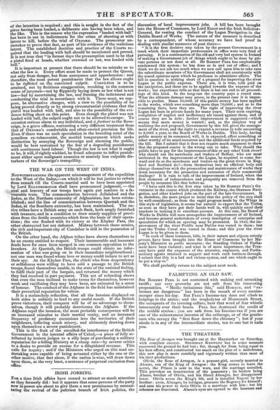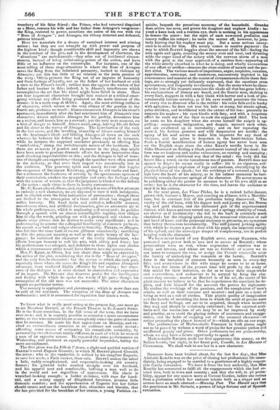THE THEATRES.
The Rose of Arragon was brought out at the Haymarket on Saturday, with complete success. SHERIDAN KNOWLES has in some measure recovered the ground he had lost ; for, though far from being equal to his best efforts, and constructed too much on the plan of a melodrama, this new play is more carefully and vigorously written than most of his later productions. Olivia, the Rose of Arragon, is a peasant-girl, secretly married to Alonzo, son of the King of Arragon : the King comes to learn the secret, the Prince is sent to the wars, and the marriage annulled. This provokes an insurrection of the peasantry ; its leaders being Alasco, brother of Olivia, and his friend Almagro, her disappointed lover. Olivia saves the King's life, and is installed Regent by her brother : anon, Almagro, by intrigue, procures the Regency for himself; and uses his power to force Olivia to a marriage with him : but his schemes are frustrated. Alasco's eyes are opened to the baseness and treachery of his false friend : the Prince, who had returned disguised as a Moor, rescues his wife and her father from Almagro's vengeance :
the King, restored to power, sanctions the union of his son with the " Rose of Arragon "; and Almagro, his villauy -detected and defeated, poisons himself. Here are materials for a drama of sustained interest and stirring action ; but they are not wrought up with power and purpose of
the highest kind : though considerable skill and ingenuity are shown in the conduct of the plot, and in the development of character, the "situations " are melodramatic—they arise out of incidental circum- stances, instead of being culminating-points of the action, and have little or no influence on the catastrophe. For instance, one of the Most telling of these stage-situations is where the Rose of Arragon eaves the King from the infuriated peasantry, incited to violence by Almagro ; yet this has little or no relation to the main passion of the story : Olivia protects the King out of an impulse of humanity and from feelings of loyalty, not as the father of her husband or with a view to the Prince's recall ; neither does she oppose the wishes of her father and brother in this; indeed, it is Alasco 's interference which accomplishes the act that his sister might have failed in alone. Here are four important characters brought into contact at a critical emer- gency without any effect being produced on the main interest of the drama : it is a mere coup de thedtre. Again, the most striking collision of character, which occurs at the very climax of the passion in the fourth act, produces no result: Alasco encounters Almagro in his sister's apartment, immediately after she bad convinced him of Almagro's true character; Alasco upbraids Almagro for his perfidy, denounces him as a traitor, and taunts him as a coward ; yet the very next moment, on a hint of danger to himself Alasco steals away, leaving his old father and his sister at the mercy of Almagro. The introduction of the rack in the last scene, and the revolting absurdity of Alasco seating himself on the headsman's block and bidding Almagro sit down on the rack
j
whereon he believes his father had just before expired in torments, while he lectures the supposed murderer previously to offering him " satisfaction," stamp the melodramatic nature of the incidents. Yet there are elements of passion and character in the play, that might have been made to produce dramatic effects far more impressive than such shocking improbabilities as this ; and the dialogue is full of beau- ties of thought and expression,—though the speeches were often marred in the delivery, so that even their import was occasionally lost to the audience. The generous spirit and manly fervour that inspire the eloquence of SHERIDAN KNOWLES, giving to old truths and fami- liar sentiments the freshness of novelty by the spontaneous aptness of their enunciation, awaken the sympathies and carry the feelings along with the course Of events, so that the judgment is blinded to the defects of the action : such virtue is there in hearty earnestness.
Mr. C. KEAN played Alasco; and, regarding it as one of his few attempts to embody a new character, we are disposed to view it with indulgence, and to cherish even the faint indications of personation ; though these are limited to the assumption of a blunt and direct but dogged and 'sullen honesty. His fixed looks and attitudes, inflexible manner, monotonous tones, amid artificial declamation, give an automatic air to his whole performance, which is unpleasing and unnatural; he gabbles through a speech with an almost unintelligible rapidity, that obliges him to clip the words, grinding out with a prolonged and violent em- _Thesis some phrase that he desires to make very significant ; and in endeavouring to assume the colloquial familiarity of common parlance, his speech was bald and vulgar almost to brutality. PHELPS, as Almagro, also fell into the same fault of coarse glibness occasionally ; sacrificing in this the pregnant meaning as well as the poetic beauty of the lan- guage: he sustained the character of the crafty dissimulator, who affects brusque honesty to veil his arts, with ability and force ; but his performance was unequal, and deficient in those lights and shades which a consummate artist would have thrown into the personation. Mrs. C. KEAN, as Olivia, has less share than might be expected in the action of the plot, considering that she is the " Rose of Arragon," and the only female character ; but the scenes in which she took part, especially those where she saves the King's life and repulses Almagro's advances, were rendered highly effective by her acting : her utter- ance of the dialogue is at once distinct in enunciation and expressive of its import. Mr. STUART also deserves praise for the intelligence and feeling with which he spoke the words of his part ; though his assumption of the old man was not successful. The other characters require no particular notice.
The scenery is appropriate and picturesque ; which is more than can be said of the costumes. The reception of the Rose of Arragon was enthusiastic ; and it is announced for repetition four times a week.



























 Previous page
Previous page